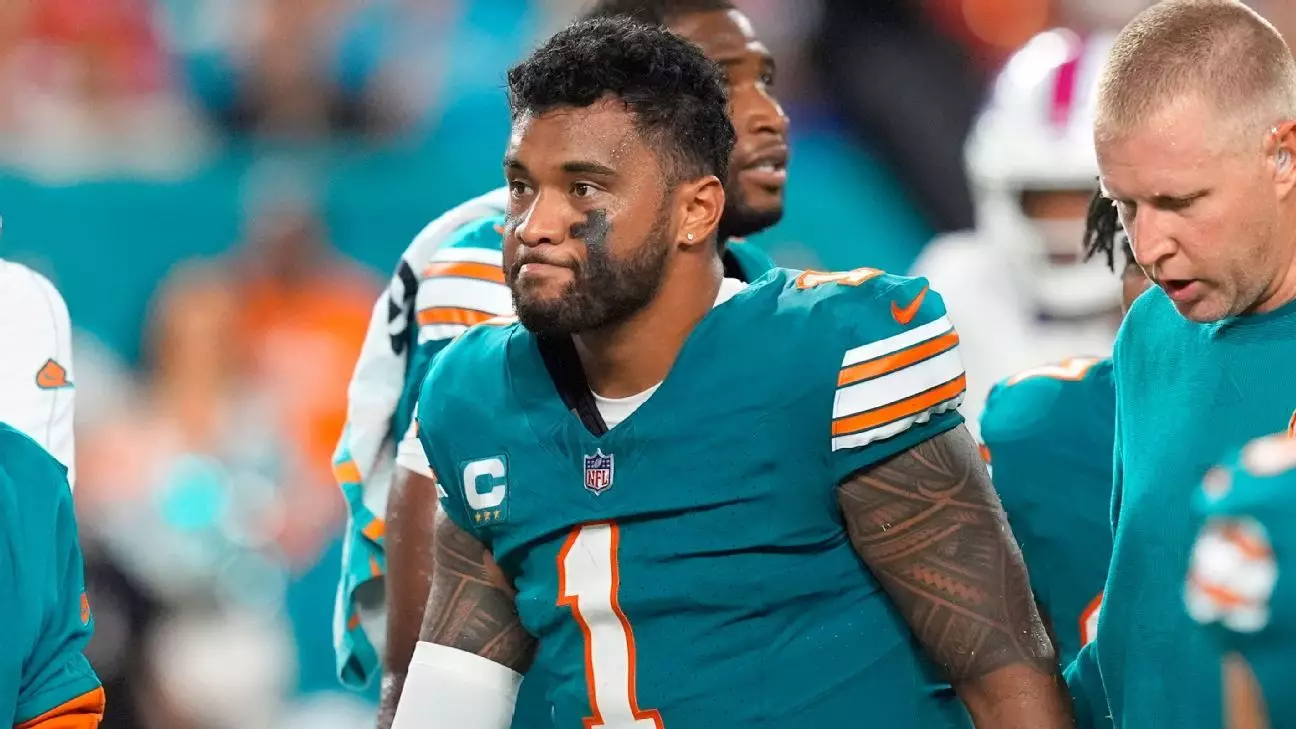The recent developments surrounding Miami Dolphins quarterback Tua Tagovailoa underscore the complex and often challenging nature of injury management in the National Football League (NFL). Following a severe concussion sustained during a game against the Buffalo Bills, the Dolphins made the decision to place Tagovailoa on injured reserve (IR). This strategic move reflects not just the immediate concerns regarding his health but also broader implications for the team’s performance and roster development.
Concussions have become a focal point in discussions around player safety in the NFL, particularly concerning quarterbacks like Tagovailoa, who have faced multiple head injuries over their careers. This incident marks the third diagnosed concussion for Tagovailoa since he entered the league, raising questions about his long-term viability as a starter. The league’s protocols dictate a minimum four-game absence for players placed on IR due to such injuries, but the cascading effects of repeated concussions can linger far beyond mere missed games.
The immediate aftermath of Tagovailoa’s injury was telling. On the field, spectators witnessed a concerning fencing response from him—a classic sign of neurological distress that raises alarms for coaches, medical personnel, and fans alike. Although he walked off under his own power, the protocols surrounding concussions dictate a careful approach to recovery, emphasizing the need for a thorough assessment. Aligning player safety with game performance is a delicate balance, and decisions like placing Tagovailoa on IR signify a commitment to prioritizing health over short-term gains.
Dolphins’ Response: Roster Adjustments and Future Outlook
In light of Tagovailoa’s unfortunate situation, the Miami Dolphins opted to sign quarterback Tyler Huntley from the Baltimore Ravens’ practice squad. This decision not only serves as a cushion for the immediate loss of their starting quarterback but also reflects an awareness of the fragility of depth in professional sports. Head Coach Mike McDaniel acknowledged the unpredictable nature of injuries in the NFL, where one play can drastically alter a team’s depth chart.
Huntley brings valuable experience to the Dolphins, having started ten games in his NFL career, including a Pro Bowl nod that came during a critical stretch for the Ravens. His addition is a calculated move to enhance the team’s resilience in the face of adversity, providing Skylar Thompson—who will start in place of Tagovailoa—a dependable option to lean on in high-pressure situations. McDaniel emphasized that this acquisition is indeed about depth rather than a critique of Thompson’s capabilities.
Thompson steps into a pivotal role this week against the Seattle Seahawks, a challenge that not only tests his readiness but also shapes the team’s overarching strategy. While he had limited playing time during the 2023 season, his prior experience from his rookie year is an asset. The Dolphins’ coaching staff must now navigate the delicate dynamics of building trust in Thompson, while simultaneously ensuring that their game plans accommodate his style of play.
As Thompson prepares for the starting role, the added pressure of having Huntley in the wings could serve as both motivation and a potential safety net. The reality of competition can breed improvement, and McDaniel’s acknowledgment of this dynamic highlights an important aspect of NFL culture—where performance is constantly scrutinized and players must embrace the competition for their positions.
As the Dolphins brace for a rigorous four-game stretch without their starting quarterback, questions linger about Tagovailoa’s future, his ability to recover, and what this means for Miami’s postseason ambitions. Should Thompson prove effective as a starter, it could reshape the franchise’s approach to Tagovailoa’s eventual return, emphasizing the intricate balance between player health and team performance.
Tagovailoa’s situation exemplifies the myriad challenges faced by NFL teams as they navigate the inherent risks of professional football. Decision-making around player safety, particularly with concussions, now takes center stage, shaping the future not just for individuals like Tagovailoa, but for the teams and the league as a whole. The Dolphins are faced with the dual obligation of fostering a winning strategy while safeguarding their franchise quarterback’s health—a task that carries significant implications for all involved.


Leave a Reply